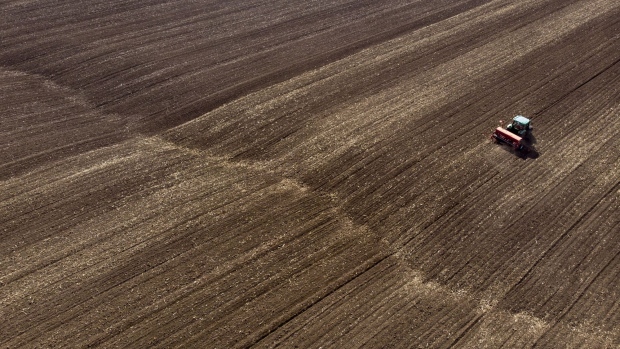Mar 11, 2022
Ukraine Farmers Urged to Sow But Fear for Workers’ Lives
, Bloomberg News

(Bloomberg) -- Ukraine President Volodymyr Zelenskiy is urging farmers to sow as many fields as possible to protect the food supply, but several of the nation’s largest agribusinesses say some plantings just won’t happen if Europe’s breadbasket remains at war.
The country should organize a full-fledged sowing campaign in all of its territory “to the extent that’s possible,” Zelenskiy said in a video released Friday. “All depends on people and the situation, because this is about life.” His nation is the world’s second-biggest shipper of grains and biggest exporter of sunflower oil.
IMC SA wants to keep its operations going, but it isn’t allowing workers into many fields because of worries about their safety, Chief Executive Officer Alex Lissitsa said Friday in an interview. Lands owned by the company, among Ukraine’s 10 largest agribusinesses, are concentrated in the north, where Russian forces are occupying villages. Bridges and roads are broken, and roadways are mined, they said, compounding the hurdles for sowings usually done by mid-May.
“Poltava hopefully will be planted, but other fields not, because I’m just scared to send my people,” Lissitsa said, naming a region east of Kyiv. “We do wish that the war will be ending soon, and then we’re going to prepare something and try to plant everywhere. But honestly, nobody knows.”
The company cultivates grains and oilseeds on about 120,000 hectares (297,000 acres), and also produces milk from its dairy herd.
Ukraine’s farming sector is one of the world’s largest and hawks its bounty of grains and vegetable oil across Asia, Europe and Africa. Russia invaded at a vital time for fieldwork, endangering Ukraine’s food supply and the global supply chain.
Farmers are pushing forward wherever possible. MHP SE, another major agribusiness, said 50,000 hectares of its land are occupied by Russian artillery, but it plans to sow the rest of its fields in two weeks if nothing changes.
“What I’m saying to the international community is that while the markets have tended to write off everything in Ukraine, technically that’s not correct, as far as bigger operators are concerned,” MHP executive chairman John Rich said in an interview from Slovenia.
The United Nations estimates 20% to 30% of the fields typically used for winter cereals, maize and sunflower seeds will go unplanted or unharvested for the coming 2022 season. Lissitsa, a board member of the Ukrainian Agribusiness Club, said summer crops such as corn could be affected more severely, with only about half the normal area planted because of the fighting and severed logistics.
IMC typically produces about 700,000 tons of corn and 130,000 tons of wheat for export. Currently, it’s focusing on ensuring local stocks and helping the government navigate deliveries of baby food and other essentials, Lissitsa said.
It also runs a dairy, and staff can’t deliver feed or veterinary services to barns housing about 1,000 cows. The electricity went out Thursday, cutting power to milking machines.
The cows “have something to eat, but not that much and only silage,” Lissitsa said. “It’s a really difficult time.”
He said a dairy farmer he knows near Kharkiv had facilities bombed, and the animals were running through the fields. The situation is better in the west, where he’s currently staying near Lviv.
But even there, supplies of fuel and workers are running short.
©2022 Bloomberg L.P.





